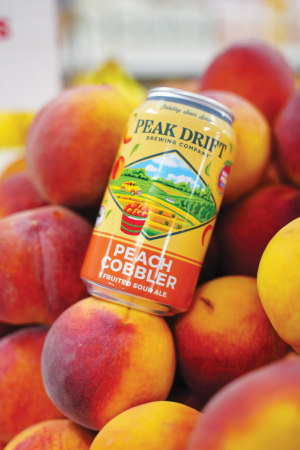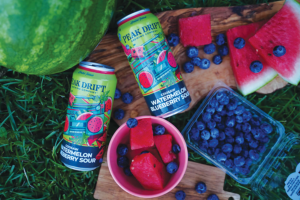Brewery, farms form productive partnership
In her native Wisconsin, Ashley Kinard-Short experienced a briefer growing season than is the case in her new home farther south.
So Kinard-Short, head brewer at Peak Drift Brewing Co. in Columbia, South Carolina — and one of two female head brewers in the state — eagerly took advantage of the change to southern scenery with a recent beverage innovation showcasing fresh produce.
Kinard-Short, who has a biology degree and a keen interest in the science of brewing beer, helped Peak Drift kick off a partnership with two venerable producers of South Carolina produce: McLeod Farms in McBee and Coosaw Farms in Fairfax. The brewery is featuring McLeod’s regionally renowned peaches, along with blueberries and watermelon from Coosaw Farms, in two signature sours launched this summer.

McLeod Farms, in Chesterfield County, was established in 1916 and produces more than 50 varieties of peaches on nearly 1,000 acres. Some of those are featured in Peak Drift’s Peach Cobbler Sour Ale.
Coosaw Farms, which grows 120 acres of blueberries and 450 acres of watermelon at its main Hampton County location, supplied the blueberries and watermelons for the brewery’s Coosaw Watermelon Blueberry Sour.
“When it comes to flavor, freshness is a crucial element, and when you can get ingredients from local farms, quality and freshness are guaranteed,” Kinard- Short said.
ONE-STOP PRODUCTION
Peak Drift is even more closely tied to the local produce than the branding on the beer’s custom, colorful labels. The 65,000-square-foot complex located in the up-and-coming North Main section of the capital city features a 25,000-square-foot production facility where the fruit was pureed in-house.
And those labels were printed on the brewery’s $4 million, 17-ton high-velocity commercial digital can printer.

Sanitized peaches were run through a press, then destoned and pureed, said Jason Synder, vice president of sales and operations for Peak Drift Beverages. The produce then moved on to the pasteurization process, which kills any active sugar.
Once finished, the mixture was separated into large totes for immediate use and for freezing.
The blueberries are also pureed and pasteurized on-site, while the watermelon — with rinds too big to be handled at the brewery — was processed and shipped from Coosaw Farms’ partner Seaside Farms, with fields next to Coosaw’s St. Helena Island satellite location in Beaufort County.
“With the rind and how mealy some watermelons are, to give that brightness that they want — it’s not an easy process,” said Cal Hucks, lead of coastal operations for Coosaw Farms. “Because they (Seaside Farms) do things with Bloody Mary mix and they do things with their tomatoes, they were able to take those watermelons and process them in a way that no one else could.”
Seaside Farms “sent us an equation” to help achieve the correct Brix value (a measure of dissolved solids in a liquid used to determine dissolved sugar content), Snyder said.
“I gave it to Ashley, the science lady,” Snyder said. “Based on their yields from tomatoes, we were able to determine how many pounds we needed for our batches.”
After pasteurization was completed, the beverages were packaged.
“That took another day,” Synder said. “It’s not easy. It’s still more cost-effective than buying the puree.”
The appeal of efficiency, along with a desire for freshness, helped drive the partnership.
“Being able to do it locally and do it ourselves is always great, but financially, that’s also where it comes into play,” said Greg Middleton, who co-owns Peak Drift with sister Sara Middleton Styles. “We were finding a barrel of blueberry puree might cost you $800, but to get it shipped from the other side of the country would cost you more in shipping than just buying blueberry puree. So what we said was, instead of buying it from these large puree manufacturers, which is what most craft breweries do, we said let’s just buy the equipment ourselves.
“We’ll go direct to the farm, buy the produce from them, and then press it ourselves.”

Further, unlike the printed sleeves used on some canned beverages, cans laser- printed at Peak Drift are 100% recyclable. And having the printer on-site means changes can be made in real time, Kinard- Short said.
“We can make tweaks and upload it and change it over right away,” she said. “It’s neat to have that ability. … This is our best way to be more sustainable and do something a little better for the environment.”
A FRUITFUL COLLABORATION
The Peak Drift partnership with state producers is an example of what the South Carolina Department of Agriculture is trying to achieve through programs such as Certified SC Grown and the Growing Agribusiness Fund, a $40 million agribusiness incentive program announced in August.
“We are in the business of helping farmers add value to their crops, add value to their farms,” said Clint Leach, assistant commissioner of the state agricultural department. “You can really see the passion Peak Drift and their folks have for South Carolina agriculture, and this is just the beginning. We’ve had conversations about other fruits and vegetables.”
Kinard-Short said Peak Drift’s production equipment can also process palm fruit, apples and pears, which can be fed onto the belt press after sanitizing instead of run through the puree machine for use in ciders. The puree process can also be used to produce increasingly popular smoothie seltzer styles, she said.
“We started with kind of a slow learning curve to get to know the equipment, but by next year, when we’re a little more seasoned, we should be able to get a few totes (of fruit) done within a few hours,” Kinard-Short said. “One business day would probably be close to a batch of beer.”

Rachel McCormick, McLeod Farms marketing coordinator, said the family- run operation would find any additional collaborations … well … quite peachy keen.
“As farmers, we don’t want anything to go to waste, and so the processing helps that,” she said. “Companies like Peak Drift come to us and say, ‘We want a load of your seconds to make beer,’ and we’re like, ‘Absolutely. Let’s do this.’ ”
Hucks also expressed enthusiasm for an ongoing relationship in between stealing glances at his farm’s name featured prominently on the can label.
“It gives us so much validation for what we’re doing,” he said. “We are so excited to be able to share what we grow with our neighbors and our communities. It’s something so special, you really can’t put it into words.”










